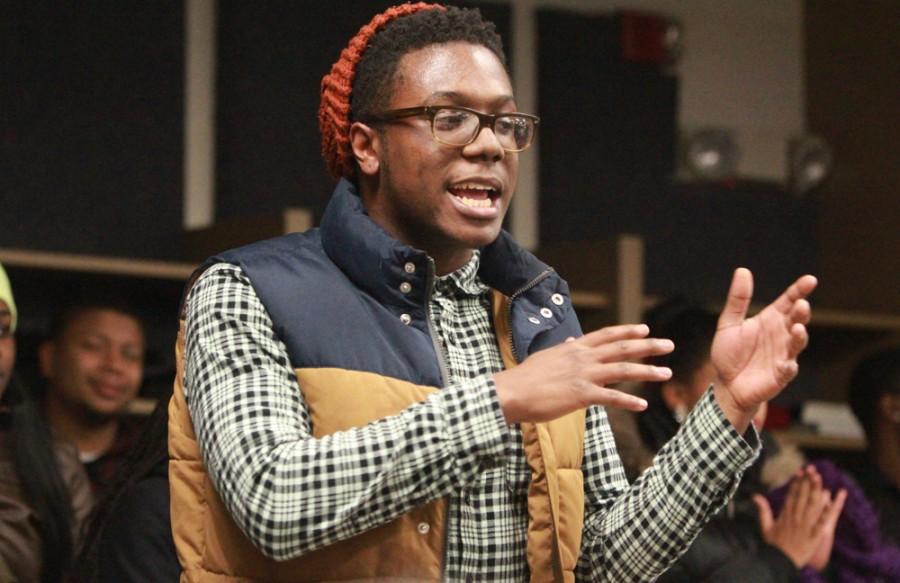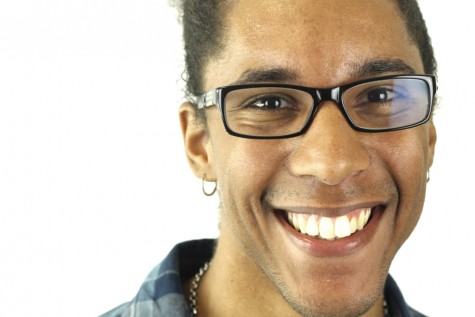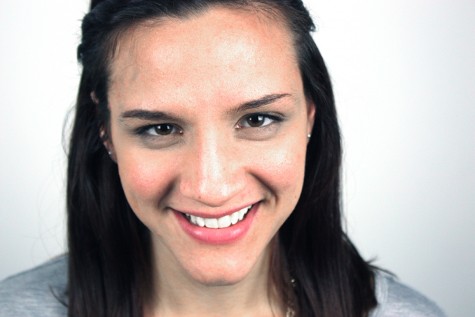Ferguson sparks movements among Eastern students
Chynna Miller| The Daily Eastern News Brian Hannah, a senior communications studies major, talks about unification within the black community Monday during The Movement Beyond Ferguson: Being Black in America in Coleman Auditorium.
December 2, 2014
When Travon Moore, a senior accounting major, first entered into Ferguson, Mo., Saturday evening he said he didn’t know what to expect.
“I saw military tucks hidden behind big businesses, then I started seeing the burning buildings, it’s different from seeing it on the media and actually being there,” Moore said.
Moore was one of the audience members at the Black Student Union’s “The Movement” forum Monday evening.
The forum came in light of the grand jury’s decision not to indict Ferguson police officer Darren Wilson for shooting and killing 18-year-old Michael Brown in August.
Those at “The Movement” discussed what it’s like to be a black face within in a white place and how the African-American community can uplift together. More than 100 showed up for the forum all representing different ethnicities, genders and age groups. Moore said while he was in Ferguson, he saw the memorial of where Brown’s body laid for four hours on Canfield Drive, which was surrounded by bikers, but at the memorial there was a speaker.
Aside from anger, the atmosphere had people on edge, shocked and also hurt because of the decisions.
“When I walked up, it was like a funeral, It was all just one feeling — sadness,” Moore said. “You see reporters everywhere, you see people with cameras, news, CNN and then after they left NAACP came.”
When the National Association for the Advancement of Colored People arrived on the scene of the protesting, some community members were outraged because they felt the organization was there for the media’s attention and they could have did more for the Ferguson community, Moore said.
“You can’t think of it negatively, you have to think of it positively. NAACP is here to help; once again, we (blacks) are divided from the unity,” Moore said.
Black people having a lack of unity was an issue many spoke on; there plenty of students within the audience said blacks are sometimes their own worst enemy.
“We need to wake up and get it together,” one student said.
Bria Caldwell, the vice president for NAACP, said black people are often a more reactive than proactive group of people.
Faythe Missick, a graduate student in the political science department, who agreed with what was said about black people being their worst enemy said, they don’t support one another anymore.
Aside from the lack of unity, many students understood why those within the Ferguson community looted, rioted and protested, which lead to at least two police cars being set ablaze along with 12 buildings; however, most students felt there could have been a different approach to getting their message across.
“They’re pissed off because of what continues to happen,” said Tionna Alderson, a senior communication disorder sciences major. “(But) what is violence going to get you?”
The lack of a male role model within black households due to incarceration rates, shifting in black culture and institutionalized racism were also topics of the night.
One student, Dionte McWillis, a junior history major, said he disagreed with the violence sending a wrong message, he said the force is at times necessary.
“If you want to get stuff done you have to show force,” McWillis said.
Amidst clapping and cheering from his first comment about how America see’s black men as a threat and problem, Corinthian Bethel, the president of NAACP, said “Stop accommodating white folks, we’re civil, we know how to act.”
Nearly all of the students at the forum all came to a consensus about the issue in Ferguson being a race issue; multiple times students said if the tables were turned with Wilson being black and Brown being white, there would have been a trial, Wilson would have been sent to jail — no questions asked.
“It’s too many times a black male is killed by a white officer,” Missick said.
Roberto Hodge can be reached at 581-2812 or rlhodge@eiu.edu




![[Thumbnail] Eastern's Old Main was quiet Thursday morning while educators who had left the office to strike picketed outside.](https://www.dailyeasternnews.com/wp-content/uploads/2025/04/Strike_01_LT_O-800x1200.jpg)










![[Thumbnail Edition] Senior Foward Macy McGlone, getsw the ball and gets the point during the first half of the game aginst Western Illinois University,, Eastern Illinois University Lost to Western Illinois University Thursday March 6 20205, 78-75 EIU lost making it the end of their season](https://www.dailyeasternnews.com/wp-content/uploads/2025/03/WBB_OVC_03_O-1-e1743361637111-1200x614.jpg)















![[thumbnail edition] Assistant Coach of the Linebackers, Rodman Noel talking to the linebackers about their positions at O'Brien Field on the Eastern Illinois University campus, Charleston Ill.](https://www.dailyeasternnews.com/wp-content/uploads/2025/04/FB_24_O-1-e1744671213207-1200x609.jpg)









































